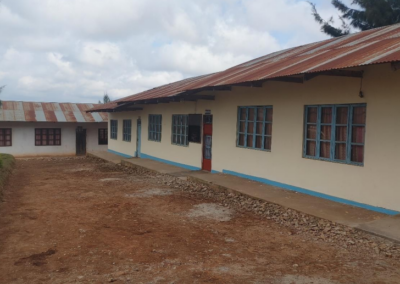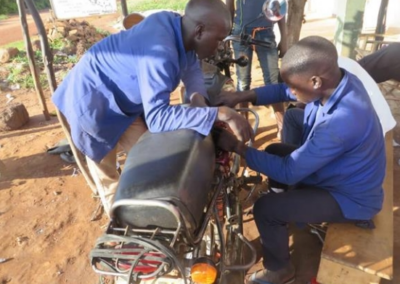Development Aid from People to People (DAPP) has been managing a Children’s Town since 1990. This program has served as a rehabilitation initiative for street children and provided formal primary and secondary school education. More recently there has been a heightened focus on Vocational Skills, leading to the establishment of a dedicated unit known as the Youth Academy.
The Youth Academy provides residential vocational training in agriculture, food production and tailoring. The training takes two years allowing the participants to undergo a holistic transformation process. It provides reintegration support to facilitate a smooth transition back into their communities. It provides starters toolkits to some enabling them to initiate their own income-generating activities and seeks placement opportunities within local enterprises for others.
DAPP covers the reintegration support cost, and the Van Doorn Foundation supports the procurement of the necessary equipment and tools for vocational training. The Van Doorn Foundation is looking for sponsors for the € 4,700 needed to purchase the equipment and tools!
Amount required: € 4,700
Amount collected: € 4,700
Sponsors: Stichting Overal Nijmegen and Van Doorn Foundation
Project information
The situation
The exact number of street children in Zambia is not known, some estimate it to be 75,000 (in 2019 UNICEF believed it was 30,000 in Lusaka alone), some double that figure, some put it at close to 500,000, yet one thing is known, the number of street children in Zambia has risen inexorably attributed to neglect by parents or guardians due to poverty or sickness, death of parents and grandparents or broken homes because of addictions.
The government, together with NGOs, have acknowledged the extent of the problem with the Zambian Ministry of Community Development and Social Services (MCDSS) in 2018 launching the ‘Efficiency and Effectiveness for Vulnerable Children and Adolescents Initiative (SEEVCA) programme’ in 15 districts in Zambia. More recently they have started placing some of the street children into training centres run by the Zambia National Service where, according to the Zambian government, “When they complete their training, they will be awarded with Certificates and provided with start-up tools and materials needed for them to excel in the businesses that will help them put their skills into practice”. However, the programs are short lived and most of the children return to the streets having nowhere to peddle any skills gained in an economy where, in 2020, the estimated youth unemployment rate in Zambia was at 22.63%, much higher in urban areas and for those who haven’t any, or limited, education.
The importance of the project
The Zambian cities face significant challenges in addressing the high number of children living and working on the streets. The reasons for these children ending up on the streets can be contributed to the following causes:
- former street children often come from backgrounds characterised by extreme poverty, broken families, illness, or death of parents or guardians, neglect, and abuse of caretakers. Consequently, within their households, these children frequently lack the emotional and financial support necessary for their well-being and development.
- many street children have had little or no access to formal education. This lack of education severely limits their opportunities for personal growth and employment.
- street life exposes children to various dangers, including violence, exploitation, sexual abuse, prostitution, exposure to sexually transmitted infections, alcoholism, drug addiction and other substance abuse.
- street children may lack crucial life skills such as self-confidence, effective communication, and conflict resolution, making it difficult for them to function effectively in society.
- without vocational skills or access to viable job opportunities, these young individuals find themselves economically marginalised, and often trapped in exploitative labour conditions that perpetuate the cycle of poverty.
The project endeavours to address the above challenges through a comprehensive program.
The implementing organisation
Development Aid from People to People (DAPP) is a Zambian not for profit, non-government organisation established in 1986. The organisation is committed to fostering community development by equipping people with the necessary skills, knowledge, and tools to combat poverty, illiteracy, and disease. DAPP’s main activities are education, health, agriculture, and community development.
DAPP has been managing a Children’s Town since 1990, providing formal primary and secondary education and dedicated to the rehabilitation of former street children and improving their skills with the ultimate goal to get them out of street life and successfully reintegrate them into their communities. In 2022, there was a heightened focus on Vocational Skills, leading to the establishment of a dedicated unit known as the Youth Academy.
The Youth Academy provides residential vocational training in agriculture, food production and tailoring. The training takes two years allowing the participants to undergo a holistic transformation process and prepare for TEVETA exams.
The envisaged project results
The Youth Academy will provide a safe and supportive environment where former street children can recover from trauma and build self-confidence. Through counselling and psychological support, they will be empowered to address their emotional wounds.
The Youth Academy will enhance life skills development, incorporating drama, poetry, and sports programs. It provides a platform for these young adolescents to explore their creative talents, build self-esteem and develop interpersonal skills.
The project shall also offer basic and functional literacy program to ensure that with limited formal education they can acquire essential reading, writing and numeracy skills. It is not an academic program but an added initiative that bridges their education gaps and empowers them with the ability to access information and use literacy skills to make informed decisions.
The project provides reintegration support to facilitate a smooth transition back into their communities. It will provide starters toolkits to some enabling them to initiate their own income-generating activities and will seek placement opportunities within local enterprises for others.
Chance of sustainability
The Youth Academy is committed to financial sustainability beyond the initial funding period. To ensure sustainability, long-term, DAPP Zambia and the Government of the Republic of Zambia have committed resources from their internal sources to continue support the programme of the Youth Academy. The organisation is also seeking collaboration with commercial entities operating in the country, and with government agencies and non-profit organisations to explore opportunities for shared resources and co-funded initiatives. Diversification of funding sources and continuous fundraising efforts will further contribute to financial resilience of the Youth Academy.
The required funds
The project consists of reintegration support for 30 former street children, providing them vocational training and for some starters toolkits (to initiate their own income-generating activities) and for others seeking placement within local enterprises. DAPP will cover the reintegration support cost and the Van Doorn Foundation supports the procurement of the necessary equipment and tools for vocational training. Van Doorn Foundation is looking for sponsors for the € 4,700 needed to purchase the equipment and tools!

Dear visitor,
We are grateful that you are willing to support us with a donation!
Please fill in the fields below and push the button PAY to transfer the amount by iDeal.




